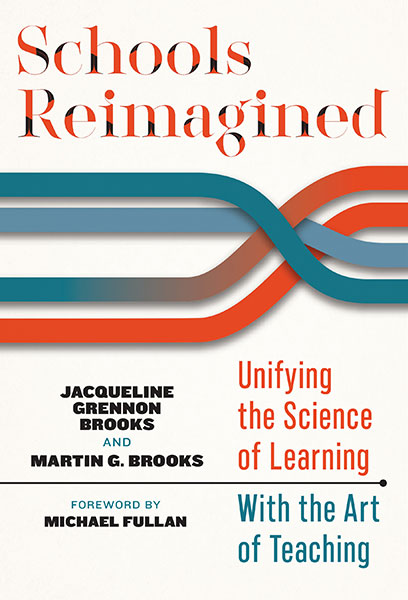Professors: Request an Exam Copy
Print copies available for US orders only. For orders outside the US, see our international distributors.
Jacqueline Grennon Brooks, Martin G. Brooks
Foreword by: Michael Fullan
Publication Date: February 12, 2021
Pages: 192

The pause in the traditional structure of schooling due to COVID-19 presents a unique opportunity for openness on many different levels: openness to the science of learning, openness to schoolwork centered around big ideas and authentic problems, openness to responsible assessment practices, and openness to a renewed ethic of social justice. In this book the authors make the case that now is a timely moment to reimagine schools and put the intellectual and social-emotional health of students and teachers at the center of the educational process. They offer practical classroom examples across disciplines and grade levels based on constructivist pedagogy, neuroscience research, psychological theory, and design thinking, as well as on their own experiences in observing and advancing instructional practice that fosters human development. Schools Reimagined will help administrators and teachers to structure their settings in ways that maximize the likelihood of meaningful and enduring student learning.
Book Features:
Jacqueline Grennon Brooks is professor emerita at Hofstra University and the author of Big Science for Growing Minds: Constructivist Classrooms for Young Thinkers. Martin G. Brooks, executive director of Tri-State Consortium, served as a superintendent on Long Island, NY, for 16 years.
“Jacqueline Grennon Brooks (emer., Hofstra Univ.) and Martin G. Brooks (executive director, Tri-State Consortium) reimagine schools as always open to engage learners in constructing new knowledge and becoming ethical members of society.”
—CHOICE
“You won’t find a more comprehensive, insightful, and memorable account of constructivist learning than what is provided in this wonderful cumulative account of what great learning is and how we should establish and pursue it…. Schools Reimagined is a complete, succinct, and rich guide to new action—the kind of action that is badly needed as we develop a new system out of the ravages of COVID-19. A timely book indeed!”
—From the Foreword by Michael Fullan, professor emeritus, OISE/University of Toronto
“A wonderfully satisfying follow-up to In Search of Understanding, the authors' classic introduction to constructivism. Once again, they've provided an authoritative and accessible guide to the theory of deep learning, along with a generous helping of classroom examples from preschool to high school. Highly recommended for current and prospective teachers as well as administrators and teacher-educators.”
—Alfie Kohn, author and lecturer
“Powerful, engaging, and visionary! Grennon Brooks and Brooks present a must-read for all teachers interested in why and how to create meaningful experiences for all students.”
—Yong Zhao, Foundation Distinguished Professor, University of Kansas; professor in educational leadership, Melbourne Graduate School of Education
“This book lays out a compelling case for schools as learning environments in which teachers and students construct new understandings centered on big ideas, provocative questions, and transdisciplinary concepts. It is as academic as it is practical, and is equally suitable for teacher educators, school leaders, and practitioners.”
—Giselle O. Martin-Kniep, educator and president, Learner-Centered Initiatives
Contents
Foreword Michael Fullan ix
Preface xi
Acknowledgments xv
Part I: Making the Case for Constructivist Schools
1. Imagining Schools as . . . 3
A Simple Proposition 3
Implications for Schooling 5
Paradigm Shift 7
Information or Knowledge? 8
Meaningful Work 11
Tracking Worthy Outcomes 11
At a Crossroad 13
Every Classroom a Journey 14
2. Transforming Schools From the Inside Out 17
Preschoolers Take a Nature Walk 17
Elementary School Students Simulate an Oil Spill Cleanup 20
Middle Schoolers Respond to a Global Challenge 22
High Schoolers Become Stewards of Water Quality 25
Undergraduates Include Social Justice in Studies of the Changing Earth 27
Teachers Transform Their Practice 28
3. Searching for Meaning 31
Making Sense of Things 31
Our Personal Pantheon 33
Wiring and Firing 42
Opening New Doors to Self-Regulation 44
Images of Learners 46
Part II: Guiding Principles
4. Tying the Learning Frameworks Together 51
Math: What Boats and Medicines Can Teach Us 52
Science: What Ants Can Teach Us 54
Social Studies: What Huckleberries Can Teach Us 56
Literacy: What Artifacts Can Teach Us 58
The Arts: What Windy Days Can Teach Us 60
Language, Libraries, Health: What Rocks and Water Can Teach Us 61
Embedding the “What,” Guiding the “How,” Providing a “Why” 65
5. Framing Curricula and Teaching Around Big Ideas 69
Big Ideas and Points of View 70
Negotiating Curricula 72
Just-in-Time Teaching 73
Content–Process Dynamic 74
Posing Problems of Emerging Relevance 79
6. Fostering the Development of Reasoning With Design Thinking 83
Models of Design Thinking 83
Failing Forward 85
Innovating With Design Thinking 86
Design Challenges 89
Teaching With Design Challenges 91
7. Deepening Reasoning With Transdisciplinary Strategies 97
1. Ordering Learning Experiences 98
2. Hearing the Questions Students Hear 100
3. Offering Time to Think 101
4. Seeking Elaboration 102
5. Facilitating the Search for Patterns 103
6. Valuing Evidence 104
7. Connecting Students With Each Other 106
8. Posing Targeted Questions 107
9. Appreciating Context 108
10. Cultivating a Sense of Place 109
11. Supporting Student Agency 110
12. Navigating Error 111
8. Responsibly Assessing Student Learning 115
The Perils of Grading 116
Data Versus Evidence 117
Connecting Teaching to Assessing 118
Assessment That Generates Student Thinking 120
Performance Assessment 123
Responsible Assessment 124
Changing the Narrative 126
Part III: Stepping up and Speaking Out
9. Shifting Norms and Structures 131
Visioning and Valuing 131
Establishing a Culture of Learning 133
Aligning Curricula 134
Collaborating With Parents 135
Differentiating for Equity 136
Considering Space and Time and Technology 138
School as a Concept 140
10. Moving to the Next Level of Work 143
Why 144
How 146
For Whom 147
References 151
Index 163
About the Authors 173
Professors: Request an Exam Copy
Print copies available for US orders only. For orders outside the US, see our international distributors.